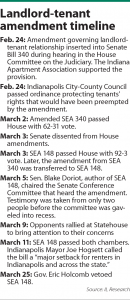Subscriber Benefit
As a subscriber you can listen to articles at work, in the car, or while you work out. Subscribe NowBefore issuing a public statement, the Fair Housing Center of Central Indiana sent out a private thank you.
The nonprofit had been part of a successful effort to derail the amended Senate Enrolled Act 148, which fair housing advocates feared would further disadvantage tenants in Indiana and lead to more evictions. Gov. Eric Holcomb vetoed the measure March 25, saying the language was “overly broad” and, in a reference to the ongoing pandemic, this was “not the right time” for such a law.
This is the first veto Holcomb has issued in 2020, and it was put on a bill he and housing advocates originally supported. However, late in the session, an amendment was attached that regulated certain aspects of the landlord-tenant relationship and prohibited local municipalities from enforcing landlord-tenant ordinances.
Hundreds from across the state — including housing advocates, religious groups, community organizations and individuals — quickly mobilized to oppose the amendment. After they failed to stop the bill in the Statehouse, they appealed to Holcomb for a veto.

When the veto was announced, Amy Nelson, executive director of the Fair Housing Center, passed along the news with a thanks to those who worked to defeat the bill. “We know you made calls and emails,” she wrote. “We saw your press contacts and your social media shares. We know you contacted your legislators and the governor. … THANK YOU.”
Now the nonprofits and organizations are preparing for the controversial provision to return. Nelson believes another attempt will be made to get the language into law, much like supporters of payday lenders repeatedly pushed legislation year after year.
She is hopeful, however, that the housing industry will work with housing rights groups to find solutions that work for everybody.
The Indiana Apartment Association had supported the language that was amended into SEA 148. The organization did not respond to a request for comment.
Concerns over coronavirus
In his statement explaining his decision to veto the bill, Holcomb pointed to the pandemic. The spike in the number testing positive and the growing pressure on hospitals has prompted the governor to issue, among other executive orders, a moratorium on evictions and mortgage foreclosures at least through the start of May.
“While I understand the bill was intended to create uniformity between state and local law governing the relationship between landlords and tenants, I believe this is not the right time for such language to become law,” Holcomb wrote, noting how quickly circumstances in the state have changed with the spread of COVID-19.
In addition, he indicated he would have vetoed the bill even if the pandemic had not occurred.

“Further, I believe the language in the bill is overly broad,” he wrote. “If enacted it would prevent almost any type of local control over landlord-tenant relationships. It even contains a particularly broad provision pre-empting local governments from regulating ‘any other aspect of the landlord-tenant relationship.’”
Much of Holcomb’s own opposition to SEA 148 comes from an amendment that was tacked onto the measure late in the legislative session.
Authored by Sen. Blake Doriot, R-Syracuse, SEA 148 addressed permanent foundation systems for manufactured homes and included a provision that required mobile home community operators to give the homes’ owners a 180-day written notice in advance of the community’s closure. The bill easily passed both chambers but ran into strong opposition when the amendment was included.
In fact, Nelson said housing-rights supporters liked the original SEA 148. But, she continued, when it was “hijacked,” it lost support and gained strong opposition.
Doriot did not respond to a request for comment.
Some of the amendment’s language was softened. For example, initially, tenants who believed they were being evicted because they had filed a complaint with local housing authorities had the burden of proving the landlord was retaliating. If the court found in the landlord’s favor, the tenant could have been required to pay damages and attorney fees.
 That provision was removed and replaced with language that prohibited a municipality from adopting an ordinance or regulation concerning retaliatory acts by landlords just as Indianapolis was passing such measures. The alteration did not sway either the opponents or the governor.
That provision was removed and replaced with language that prohibited a municipality from adopting an ordinance or regulation concerning retaliatory acts by landlords just as Indianapolis was passing such measures. The alteration did not sway either the opponents or the governor.
Rep. Robin Shackleford, D-Indianapolis, and Sen. David Niezgodski, D-South Bend, both urged the governor to reject SEA 148. In particular, they asserted the bill could add to the difficulties Hoosiers are already facing amid the COVID-19 outbreak.
“The effects of this pandemic will be felt for years to come,” Shackleford wrote. “It is hitting some parts of Indiana harder than others. We have to leave tenant-landlord control in the hands of local government to ensure that no Hoosier is left homeless as a result of this public health emergency.”
Likewise, Democrats who thanked the governor for the veto also mentioned the stress Indiana residents are enduring because of the outbreak.
“I’m glad that Governor Holcomb did the right thing and vetoed SEA 148,” Sen. Jean Breaux, D-Indianapolis, said. “His decision shows empathy and understanding at a time when both are needed from leadership and government. … It’s a relief that Indianapolis Hoosiers don’t have to worry about being wrongfully evicted, especially now as we continue urging people to remain in their homes to slow the spread of COVID-19.”
Next session
According to Nelson, the Fair Housing Center has received calls from Hoosier renters worried about keeping their homes after losing their jobs because of the economic turmoil caused by the coronavirus. SEA 148 was “unwanted and unneeded legislation,” she said, especially at this time when Indiana already has a housing affordability crisis.
Echoing Nelson’s point about the fight continuing, Prosperity Indiana said in a press release it looked forward to working with the impacted parties and their supporters in the Statehouse again.
Prosperity maintained that had SEA 148 been enacted, more than 2 million Hoosiers who rent – over 30% of the state’s population – would have been exposed to weakened protections from bad-actor landlords. Among other measures, the bill would have expanded the ability of landlords to take emergency possession of the domicile even when the tenant was not at fault and limited tenants’ protections from retaliation by their landlords.
Also, like Nelson, Prosperity expressed its gratitude to those who fought against the measure.
“In addition to showing appreciation to the Governor, we thank the hundreds of Prosperity Indiana members and other statewide organizations and individuals who called and wrote to voice their opposition to this legislation,” Jessica Love, executive director, said in a statement. “While their voices were shut out of the democratic process for this bill, their advocacy and calls upon the Governor helped him grasp just how many Hoosiers were counting on his leadership on this issue at this critical moment.”•
Please enable JavaScript to view this content.
